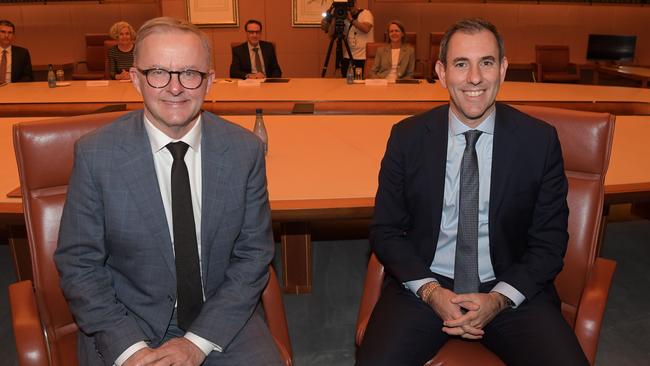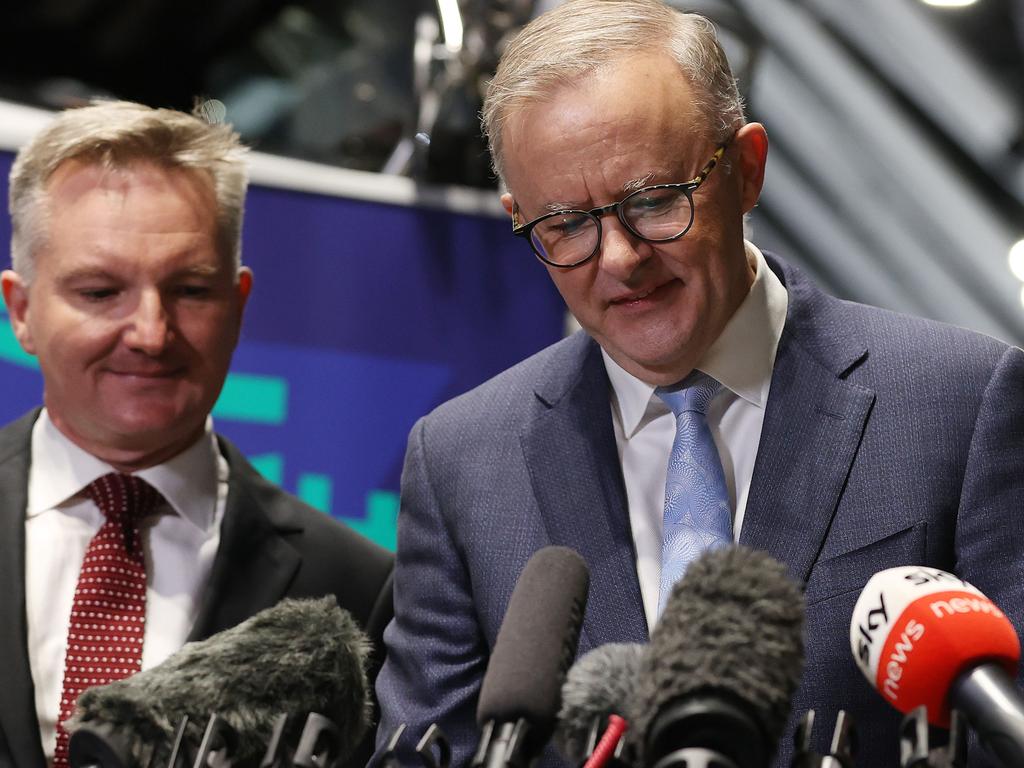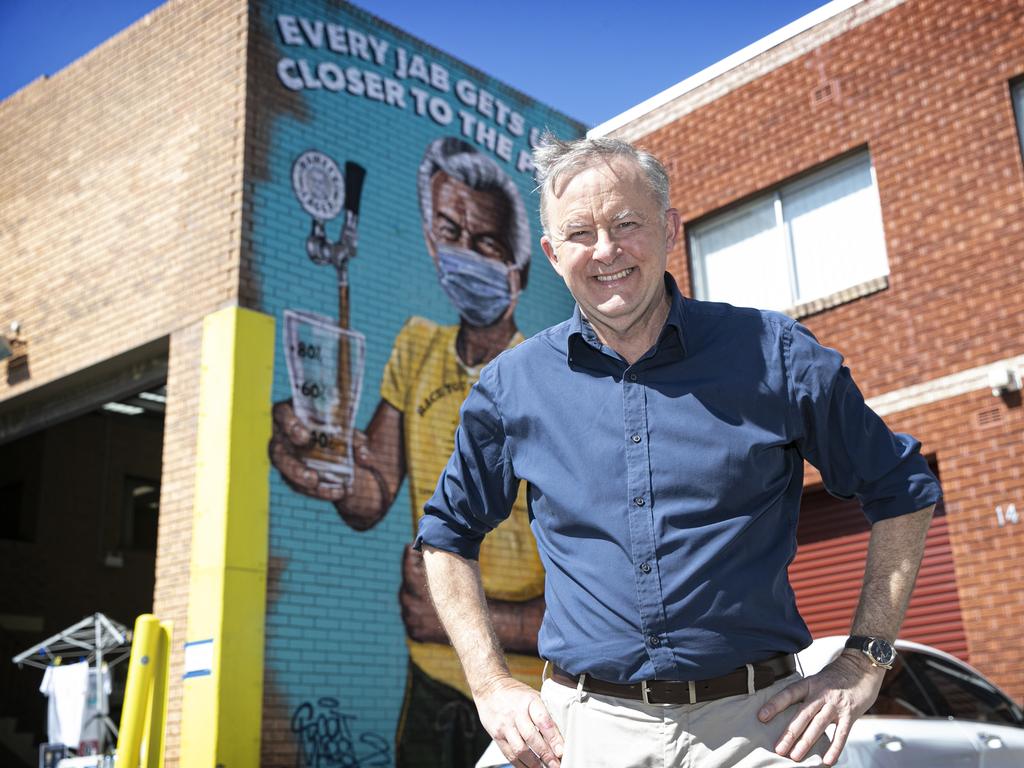
While we’ve only just put this year’s federal election behind us, one of the reasons Anthony Albanese succeeded when few in his party initially thought he would was because of long-term planning. One of his favourite lines to colleagues for years was “I want to be kicking with the wind in the final quarter”. Albanese may be a rugby league man at heart, not a code hopper like Scott Morrison, but the AFL descriptor encapsulates his approach.
It was a deliberate contrast to Bill Shorten’s strategy of seeking to win the news cycle week to week, day to day. Labor’s leadership rules meant that despite the occasional hairy moment for Albanese, namely the Eden-Monaro by-election and the need to retain the seat, his leadership was relatively secure throughout his tenure in opposition. That was true too for Shorten, but perhaps he hadn’t come to terms with that yet when taking such a day-by-day approach.
While Albanese’s long-term framing of Morrison as a blame shifter and someone not to be trusted paid off at this year’s election, as did his positioning as a small target despite criticisms for doing so, the next election will be fought differently, irrespective of whether Peter Dutton or somebody else is leading the Coalition by then.
It will be won and lost in the crucial state of Queensland, with residual interest also needing to be directed at Western Australia. Losing seats in the west could cost Labor its majority.
The election this year was a tale of contrasting fortunes between these states for Labor: picking up seats in WA; going backwards in Queensland, despite entering the campaign holding only six of the 30 seats on offer in the Sunshine State.
Put simply, Albanese won the election despite failing to crack the LNP in Queensland and despite spending an enormous amount of time campaigning there in the hope of doing so. Margins were reduced in a plethora of seats, but not by enough to claim any as wins. Albanese will be focused on taking that step next time and may need to if he is to offset potential losses elsewhere, especially in WA.
To be sure, this is a pessimistic outlook for Labor. Glass-half-full observers will hope that next time, without Morrison, with Dutton and armed with the power of incumbency, Labor can absolutely win the seats in which big margins more than halved, alongside seats perhaps held only because of popular local MPs who decide to call it a day now that the Coalition is out of office.
We know Dutton is unlikely to be as popular in southern states as he could be in his home state or in WA. Dutton is a Queenslander; so is new Nationals leader David Littleproud. That will help in their home state.
Without a reasonable number of Queenslanders in the Labor caucus the risk is that issues affecting the Sunshine State aren’t adequately addressed by the new government. It will be the job of Jim Chalmers and senator Murray Watt to prevent that happening, as well as Albanese as leader of course. His authority being thrown in Queensland’s corner when state to state disputes arise will matter the most.
Chalmers’ star will rise now that he’s Treasurer; his developing high profile will grow with the extra responsibility of running the economy. A high-profile Queensland frontbencher in cabinet could offset the lost clout of Queenslanders in the party room.
Watt, a member of Albanese’s left faction who has his leader’s ear, was elevated to the agriculture portfolio within cabinet after the election precisely because Albanese is aware of the challenges in appealing to Queenslanders at the next election.
How well Labor did in the west at this year’s election could cause issues at the next one. Winning four seats with the help of Premier Mark McGowan’s stratospheric popularity feels like a one-off. Certainly a seat such as Tangney would be high on the list of electorates Liberals think they can steal back next time. Similar hopes would abound for Hasluck and Pearce. Assuming McGowan is retired or less popular in three years, federal Labor needs to prepare for the possibility that its extraordinary showing in the west at this election isn’t replicated next time. Doing well in Queensland is the counterweight.
Contrary to assumed conservative tendencies right across the Sunshine State, the Greens were the big winners at this year’s election, picking up two seats from the Liberals (Brisbane and Ryan), and one from Labor (Griffith). These seats could be hard for the major parties to win back. Trying to do so will complicate any campaign in Queensland, causing a war on two fronts. Liberals will face such challenges elsewhere courtesy of the teals. They now know how debilitating such a scenario is.
Labor has long had to manage its adversarial relationship with the Greens, but doing so in Queensland is new, at least for federal Labor. The rise of the Greens was a major, if under reported, story of this year’s election. Labor’s internal track poll had the ALP, not the Greens, winning Brisbane. The Liberals were more alive to the scenario that unfolded. In Ryan Labor knew it was a chance, but so were the Greens. Both parties knew Griffith was problematic for the Labor Party, but Labor did poll it a few weeks out from election day and, because it was in front, left it off the track after that. More resources thrown at saving Terri Butler might have got her over the line.
The concern for Queenslanders in the Labor caucus is that the party elsewhere around the country takes a binary view of the electoral map. Labor can win without Queensland, it just did, therefore it can do so again, so forget about them and focus on what concerns voters in other parts of the country to shore up the seats of those who will hold a privileged position in caucus.
While Albanese’s rhetoric that he wants to govern for all of Australia was a marketing tool designed to highlight Morrison’s NSW-centric outlook, the Prime Minister needs to do just that if he wants a Queensland arbitrage at the next election to offset losses elsewhere. That means continuing to pay attention. Queenslanders certainly will notice if they are ignored.
Peter van Onselen is a professor of politics and public policy at the University of Western Australia and Griffith University.






Labor’s majority is wafer thin, a point it will need to be mindful of at the next election. At 77 seats it can’t afford a loss of more than one seat unless it’s prepared to govern in minority, something it will hope to avoid. We all saw how that ended for Julia Gillard, despite her administration managing policy effectively.